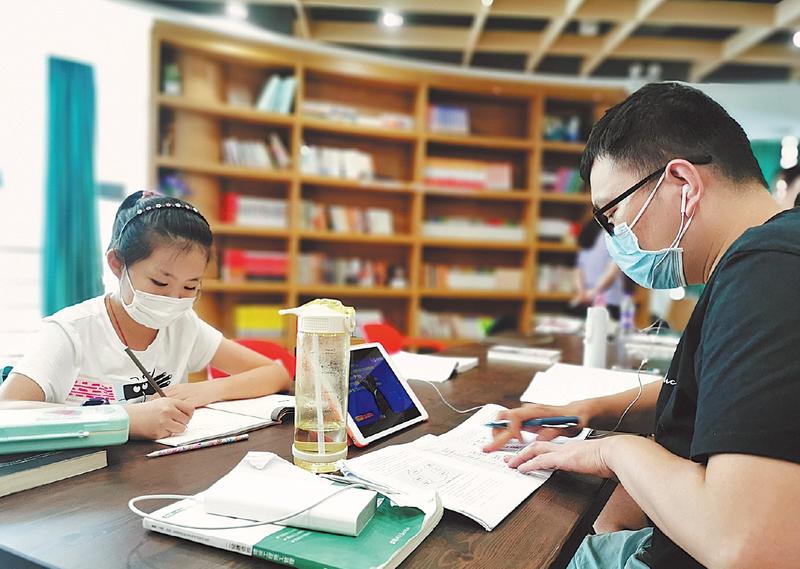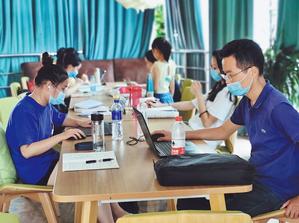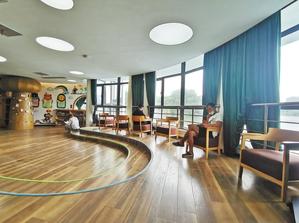About 100 reading spaces have been established across Anhui's provincial capital, Wang Kaihao reports in Hefei.
 The Apricot Flowers Academy, a bookstore and library, has become a popular hangout spot for students. (WANG KAIHAO / CHINA DAILY)
The Apricot Flowers Academy, a bookstore and library, has become a popular hangout spot for students. (WANG KAIHAO / CHINA DAILY)
For Hu Xunyou, 68-year-old resident of Luyang district, Hefei, the capital of Anhui province, Xinghua Park was an ideal spot for him to have fun with his grandson.
However, as the child has grown and seems to have developed many more interests beyond walking in the park, the name of which means "apricot flowers", the senior Hu has found himself a new reason to remain a frequent visitor. In December 2018, the Apricot Flowers Academy opened in the park.
It’s better to create an environment for people to share their knowledge and re-establish face-to-face interaction with real people
Zheng Fangfang, manager, Apricot Flowers Academy
It's a bookstore, a library and a place for people to enjoy some downtime during the scorching summer afternoons of August.
"I always like to read," Hu says. "It's not particularly for any pragmatic purpose, and it's never too late to learn new things, especially in such a nice environment."
The two-floor building, with its lakeside view, was originally planned to be a private club, the construction of which was not finished. However, as China launched a national campaign in recent years demanding such places in shared spaces like parks be returned to public use, it was repurposed to cater to the wider public interest.
Since 2017, renovation has taken place on 92 idle buildings in Hefei, just like the one in Xinghua Park, and turned them into what are called urban reading spaces, according to Meng Xianlei, director of the public cultural service office of the city's culture and tourism bureau.
 A child reads a book at the reading space. (WANG KAIHAO / CHINA DAILY)
A child reads a book at the reading space. (WANG KAIHAO / CHINA DAILY)
There are three provincial and city-level public libraries in Hefei, which has over 3 million residents in its city core, and several other smaller-scale district-level libraries.
"But they are unable to meet citizens' needs at a community level," Meng says. "That was why more spaces for reading have to be created."
In 2017, Hefei city government drafted a blueprint to set up 100 urban reading spaces like Apricot Flowers Academy by 2020, and has spent 200 million yuan (US$29.6 million) from its budget on the program.
Despite the impact of COVID-19, which saw some construction postponed, Meng says the number of urban reading spaces will reach 113 by the end of this year, exceeding the expectations of the original plan.
However, the government budget only covers the cost of constructing the reading spaces, operators of the venues have to create their own income.
"For sustainable development in the long run, it's better to blend the government support with dynamic business models," Meng says.
The city government has waived the rental costs and charges for water and power at the reading spaces, and the money to buy new books for the libraries will also be covered by the public purse. However, other outgoings, like employee wages, have to be met by profit generated by the venue.
Consequently, operators of the reading spaces are encouraged to develop their own ways of attracting more visitors and making ends meet at the same time. Meng says seasonal evaluations involving 32 criteria have been done on the dozens of reading spaces, and bonuses will be granted to those displaying excellent performance. About 6 million yuan will be allocated this year.
 People read and study at the Apricot Flowers Academy, a reading space in Hefei, Anhui province. (WANG KAIHAO / CHINA DAILY)
People read and study at the Apricot Flowers Academy, a reading space in Hefei, Anhui province. (WANG KAIHAO / CHINA DAILY)
Zheng Fangfang, the manager of Apricot Flowers Academy, understands the challenge. Every week, her team will buy about 100 new items for the bookstore, and rotate them weekly to introduce resources from the city-level libraries.
"We take the responsibility of making up the gaps in the public library system," she says. "But at the same time, we need to keep pace with the market."
Sales of cultural souvenirs, food and beverages, as well as holding paid-up training programs have helped Apricot Flowers Academy to blossom in the community. However, Zheng has a bigger ambition-to revive reading among the general public, whose time and attention has been seized by digital devices and social media.
"We have organized reading clubs," Zheng says. "People share the books they are reading in our WeChat group, and they are invited to attend in-person salons in our reading space. Sometimes, they talk about movies.
"It's better to create an environment for people to share their knowledge and re-establish face-to-face interaction with real people," she adds.
As COVID-19 wanes in China, such events have gradually resumed. Zheng is now drafting a list of planned, long-awaited lectures to cater to eager local readers.
Zheng estimates that about 40 percent of readers at the Apricot Flowers Academy are elementary and high school students. The urban reading spaces seem to have become asylums for these regular denizens of cyberspaces to escape from their digital lives.
 The second floor of the reading space is designed for hosting activities. (WANG KAIHAO / CHINA DAILY)
The second floor of the reading space is designed for hosting activities. (WANG KAIHAO / CHINA DAILY)
It takes 14-year-old junior high school student Sun Tengfei 20 minutes to travel to Xinghua Park via the subway, including the walk from the station. However, compared with home, this place offers a more immersive atmosphere for absorbing knowledge.
"My parents don't want me to spend too much time playing with my smartphone," he says. "But there are too many digital distractions at home, so I often come here during summer break to spend an afternoon reading several novels I like. It feels cozy."
And many more students treat the reading spaces as their study rooms. Sometimes, a spot will be reserved so they can have a quiet area in which to work.
However, it is difficult to cut ties with the digital world. After the outbreak of COVID-19, the reading space was temporarily closed, so an online bookstore was launched by Zheng's team to better serve the readers. It is now maintained to provide its patrons an extra option.
Still, the reading spaces have proved that staring at their phones around the clock is not the only way for urban residents to spend their spare time. According to the statistics from the city government, Hefei's reading spaces jointly attracted a total of 8.73 million visits in 2019.
Despite a hiatus lasting months and the current restrictions on the numbers of readers allowed in the venues at any one time due to pandemic prevention protocols, there still have been more than 2 million visits as of July.
Hefei now boasts the highest number of these urban reading spaces among China's provincial capitals, and more are on the way to "enable any urban resident in Hefei to reach a reading space within 15 minutes", according to Meng.
He says more work needs to be done. For example, only 10 spaces, including Apricot Flowers Academy, are currently capable of earning over 50,000 yuan a month, and around 50 are still operating in the red.
"Nowadays, the operation of bookstores is a global challenge, let alone the reading spaces which also assume the duties of libraries," Meng says. "In the future, the government may pay them to provide more services, thus further facilitating residents' requirements."
As more functions like hacker spaces, small theaters and package collection stations are planned and blended into the mix of services offered by the reading spaces, there are even more reasons for people to visit.
Contact the writer at wangkaihao@chinadaily.com.cn


